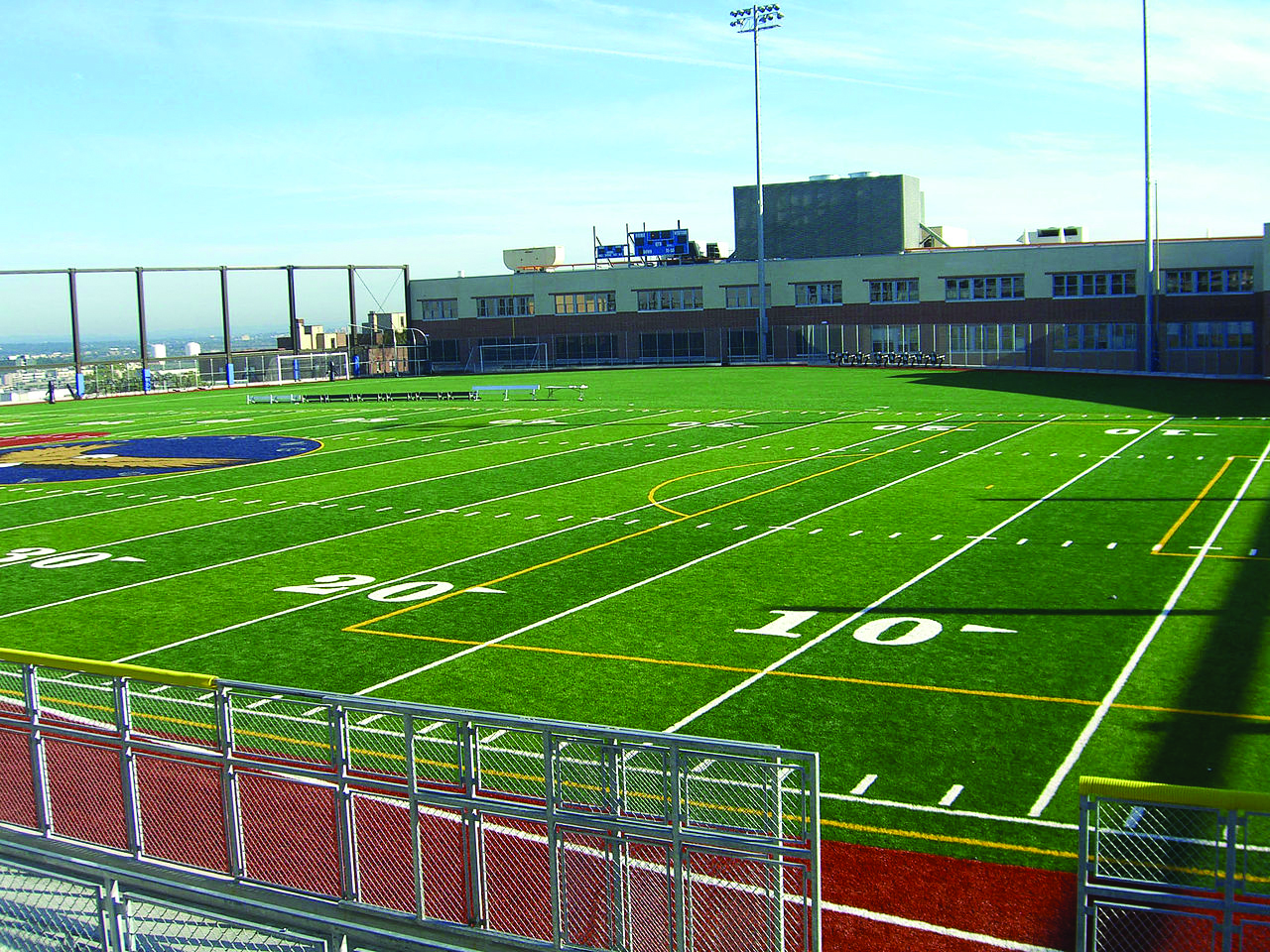In 2009, school officials in Union City, New Jersey, unveiled a dazzling $15 million athletic facility, Roosevelt Stadium. It was innovative, built on the school’s roof overlooking the Manhattan skyline. The field was so special, in fact, that it was featured in a New York Times article titled, “A Fine New Field Lifts Spirits.”
One thing about the field went unmentioned in the article: Boys had considerably greater access than girls.
Somehow, Title IX and its guarantee of gender equity was forgotten at the school of nearly 3,000 students.
Flash forward more than a decade. In November 2021, Union City staged a 50th-anniversary celebration of Title IX at the high school. The party lasted five hours and featured workshops with such Olympic athletes and coaches as Sharrieffa Barksdale, Rose Monday, Marlene Harmon Wilcox and LaVonna Martin-Floreal. More than 150 students, faculty members and coaches attended, listened, asked questions and cheered for each speaker.
Title IX is a federal law passed by Congress nearly 50 years ago. It prohibits sex-based discrimination at any school that receives funding from the federal government, including in sports programs. A four-month investigation by The Shirley Povich Center for Sports Journalism and the Howard Center for Investigative Journalism at the University of Maryland found that Title IX has fallen short of its promise for girls playing high school sports: They’re stuck in an imperfect system that continues to favor boys in many ways.
“I just loved the presentation because I feel like having that knowledge — because it wasn’t something that I was aware of before until yesterday — helps out a lot of girls and also helps my coaches understand more things they never knew or things the students never knew,” said Francisca Polanco, a senior on both the Union City High softball and basketball teams.
And now 13 years after the stadium opened, girls have equitable use of the field, too.
[ Read more stories from “Unlevel Playing Fields” ]
Union City High is, in many ways, a model for schools across the country. Over the last few years, the high school has been creating more opportunities for girls in sports.
Change began after the Bernstein Family Foundation gave a grant to the National Women’s Law Center to investigate New Jersey schools’ compliance with Title IX. The investigation prompted questions about the school’s highly unusual rooftop stadium. Roosevelt Stadium features a full-sized football field and baseball diamond that overlap. The facility seats 2,000 people with space in the baseball outfield to hold another 1,800 temporary seats for football games.
Jayma Meyer, counsel at the Simpson Thacher law firm, worked with the center. Once a competitive swimmer who ranked among world leaders in the butterfly stroke in 1971, Meyer didn’t benefit from Title IX, which became law the following year.
“I had no opportunities to receive a scholarship in college, although I went to Indiana University … and they had the best men’s team in the country but absolutely no women’s team,” Meyer said. “So, it was pretty disheartening.”
About 10 years ago, she decided to work toward ensuring girls and women had the opportunities in sports that she did not. When Meyer and a team from her law firm agreed to investigate New Jersey schools, Union City High stood out.
“There were a number of articles about this incredible football field that they built on top of their school, and they bragged about it and the amount of money that the state gave them to build this field,” Meyer said. “And it was clear that it was used only for football, and that the girls didn’t have a similar opportunity.”

The center, in partnership with Meyer and her team, approached Union City High to inform the school of its potential Title IX violations. The school was willing to make the necessary changes to comply.
Union City High School officials said they did not realize they were out of compliance. When the issue was brought to their attention, they said they committed to change.
“That’s really exactly what it is,” said Ralph Passante, the Union City Public Schools coordinator of data and community engagement, about the school’s willingness to adapt. “We have made a real effort to address those [inequities]. We are on it every year.” Passante said the changes also apply to transgender and nonbinary students.
According to a National Women’s Law Center statement in June 2019, issued about a year and a half after the school was informed about its Title IX violations, Union City High School agreed to “offer additional sports and/or additional levels of teams for girls if it is determined there is sufficient but unmet interest; Make facilities improvements, such as using its best efforts to provide girls access to the school’s state-of-the-art rooftop field overlooking Manhattan; Provide girls with equal quality equipment, coaches, trainers and training rooms and travel, and address any inequities in the scheduling of games and practice times.”
As administrators at the high school were having conversations with Meyer, her team and the center, Union City High female athletes were having conversations with their coaches.
Polanco was a sophomore at Union City High when she and some of her teammates noticed the boys were having early-morning workout sessions at the school. They believed the boys were getting certain attention and treatment the girls were not receiving, and felt comfortable speaking out to their coach.
“I never really saw it as like, ‘Oh, we weren’t allowed,’ … I remember asking my coaches, ‘Oh, why wouldn’t we do this?’ or ‘Why can’t we do this if the boys do it, too?” Polanco said.
“And after a while, I guess they, like, heard us out and they spoke to the administrators. And we got to get in the same sessions like how [the boys] did, so we would get our 6 a.m. workouts in our weight room during the offseason.”
The school’s athletics website includes a link to a document that walks students through the process of filing a Title IX complaint for discrepancies similar to the one Polanco and her teammates brought up to their coaches. The document defines Title IX, describes how to file a formal complaint, what goes into the process of investigating complaints and the standard for determining responsibility.
Additionally, Union City High agreed to report its progress to the National Women’s Law Center regarding improving conditions for girls in athletics over three years.
Because of the coronavirus pandemic, high school athletics nationally were either put on hold or took place in an untraditional manner. Meyer and her team approached the school and asked if Union City High would submit a report the year after the original agreement was set to expire.
“They’ve been very cooperative,” Meyer said. “They could have said, ‘Just, you know, go away. Leave us alone.’ But instead, they were willing to do the right thing. They agreed to submit reports that showed their efforts during each school semester to achieve Title IX compliance. The reports are comprehensive and based on them we are able to make additional recommendations.”

The rooftop field, though more accessible to girls now, is not ideal for all girls sports. While Polanco said she likes playing there, “it’s not like an actual softball field.”
“So, we still have to work twice as hard and we have to move certain parts of that so it fits to the way that we’re supposed to play,” Polanco said.
The softball team also plays at Jose Marti STEM Academy. The facility is larger than a standard softball field, meaning the girls on the team have to work three times as hard to cover all the ground, Polanco said. However, she finds the field convenient as it is about two blocks away from the high school and the team has their own locker rooms with equipment they need.
“I’m a proud athlete at Union City High School,” Polanco said. “I enjoy it a lot, the experience I’ve had here. In my mind, I just had to do what I had to do to play and if playing at Jose Marti was what we got to use and what we were given, then that’s how we were gonna play. I was fine with it. It’s not like it frustrated me to the point where I feel like I can’t play or I can’t participate.”
The school also accepted a state grant to build a soccer field for the boys and girls athletics teams.
Since the investigation, Roosevelt Stadium, which was initially used just by boys, is used for multiple sports. Passante, who handles Title IX compliance for the superintendent’s office, explained the field is now often divided so soccer teams can use a portion for a match.
When it comes to committing to continuous change and growth in regard to Title IX, the school has also taken additional steps to teach students and staff about the law, said Title IX coordinator Charles Webster.
“I was looking for training and I didn’t want to have just training on sexual harassment,” Webster said. “Yes, that’s one aspect of it, but there’s so much more.”
Union City High School is joining the Association of Title IX Administrators (ATIXA). The association allows institutions to pick a personalized curriculum surrounding issues connected to Title IX.
Athletics is an area about which Union City High hopes to gain more knowledge. Webster, with other administrators, is working toward educating students about the statute and about how sports can benefit women.
At the Title IX celebration at Union City High School last year, Webster told the crowd, “This is about you, young ladies. It’s about bringing equity to the game.”
In addition to Olympic athletes and coaches, Union City invited a college athletics counselor, a mental health expert, a pediatrician who treats athletes and Tara Sullivan, a journalist for The Boston Globe.
Webster saw the impact of the event immediately. As it concluded, a student approached him and asked whether he thought she could cover sports one day because Sullivan “made me believe I could be a writer.”


You must be logged in to post a comment.